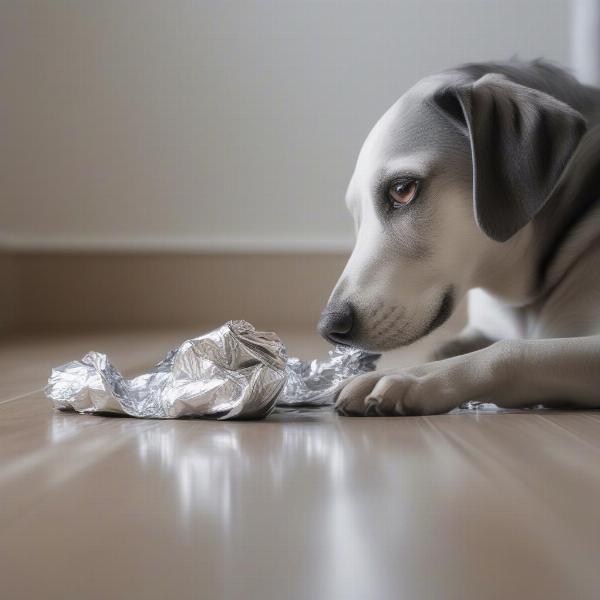If your dog ingested aluminum foil, you’re likely feeling worried. This is a common concern for dog owners. Knowing what to do next can make all the difference. While a small amount of foil might pass through without issue, larger amounts can cause serious problems. This article will guide you through what to expect, what to watch for, and when to seek immediate veterinary attention.
Understanding the Risks of Aluminum Foil Ingestion in Dogs
Aluminum foil isn’t digestible. If your dog eats a small piece, it might pass through their digestive system without incident. However, larger pieces, or a habit of eating foil, can lead to blockages in the stomach or intestines. This can be a life-threatening situation. The sharp edges of the foil can also irritate or even perforate the lining of the digestive tract.
What makes aluminum foil particularly dangerous is its tendency to clump together. This can create a foreign body obstruction that prevents food from passing through. Symptoms of a blockage can include vomiting, diarrhea, constipation, loss of appetite, lethargy, and abdominal pain.
 Dog Eating Aluminum Foil
Dog Eating Aluminum Foil
What to Do if Your Dog Eats Aluminum Foil
If you witness your dog swallowing aluminum foil, the first step is to remain calm. Panicking won’t help your furry friend. Try to assess how much foil they ate. If it was a small amount, monitor them closely for any changes in behavior or appetite. If you’re unsure of the quantity or the foil was a significant size, contact your veterinarian immediately. Do not induce vomiting unless specifically instructed to do so by your vet.
Signs and Symptoms to Watch For
Even if the ingested amount seems small, it’s crucial to monitor your dog for the following signs:
- Vomiting: This can indicate a blockage or irritation.
- Diarrhea: Changes in stool consistency, especially if bloody, warrant concern.
- Constipation: Inability to pass stool is a serious sign of blockage.
- Loss of Appetite: A sudden disinterest in food is a red flag.
- Lethargy: If your dog seems unusually tired or unresponsive, seek veterinary help.
- Abdominal Pain: Whining, whimpering, or guarding their abdomen suggests discomfort.
- Changes in Behavior: Any unusual behavior, such as pacing, restlessness, or excessive drooling, could indicate a problem.
Veterinary Treatment for Aluminum Foil Ingestion
Your veterinarian will likely perform a physical examination and may recommend diagnostic tests such as X-rays or ultrasound to determine the location and size of the foil. Treatment options depend on the severity of the situation. In some cases, the foil may pass naturally. Your vet might prescribe medications to help move the foil through the digestive system. In more severe cases, surgery may be necessary to remove the obstruction.
Dr. Emily Carter, DVM, from the Animal Medical Center of New York, advises, “Early intervention is key when it comes to foreign body ingestion. The sooner you seek veterinary attention, the better the outcome for your pet.”
Preventing Future Incidents
Prevention is always better than cure. Keep aluminum foil, along with other potential hazards, out of your dog’s reach. Ensure trash cans are securely covered. Provide your dog with plenty of appropriate chew toys to keep them occupied and prevent them from seeking out alternative items to chew on.
Conclusion
Discovering your dog ingested aluminum foil can be a frightening experience. By understanding the risks, knowing the signs to watch for, and seeking prompt veterinary care when necessary, you can help ensure your furry friend’s safety and well-being. Remember, prevention is the best medicine. Keep your home safe and provide your dog with plenty of appropriate chew toys to deter them from ingesting harmful objects.
FAQ
- What if I’m not sure if my dog ate aluminum foil? If you suspect your dog may have ingested foil but aren’t certain, it’s always best to err on the side of caution and contact your veterinarian.
- Can aluminum foil poisoning occur in dogs? While aluminum toxicity is rare, large amounts of ingested foil can potentially lead to health issues. Consult your vet immediately if you suspect this.
- How long does it take for aluminum foil to pass through a dog? This varies depending on the size of the foil and the dog’s digestive system. It could take anywhere from a few hours to several days, or it may require surgical removal.
- My dog vomited up the foil. Do I still need to see a vet? Yes, it’s still recommended to contact your vet to ensure there are no remaining pieces or internal damage.
- What are the long-term effects of aluminum foil ingestion? In some cases, if left untreated, a blockage can lead to serious complications such as tissue damage or perforation of the intestines.
Suggested Further Reading on ILM Dog
- (No relevant articles found)
About ILM Dog
ILM Dog (ilmdog.com) is your trusted resource for comprehensive dog care information, guiding both new and seasoned dog owners worldwide. We provide expert advice on various aspects of dog care, including health, training, nutrition, and more. From breed selection to senior dog care, we are dedicated to helping you provide the best possible care for your canine companion. For further assistance, reach out to our experts via email at [email protected] or phone at +44 20-3965-8624.